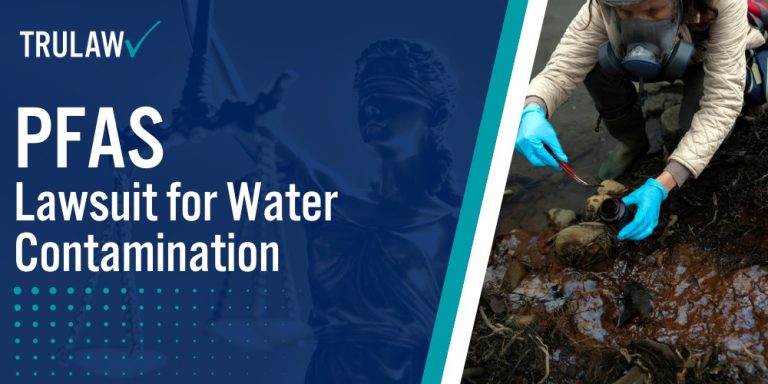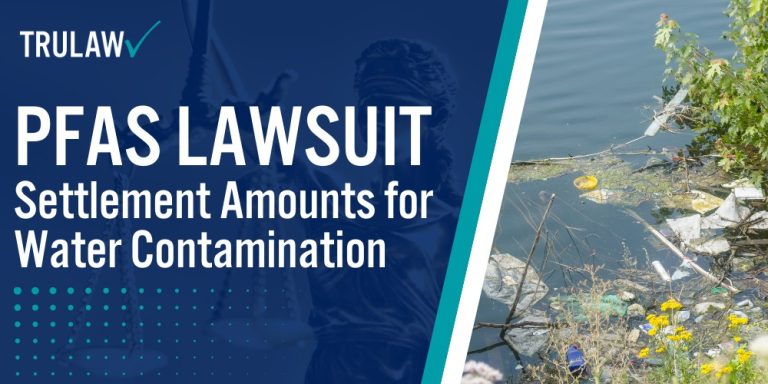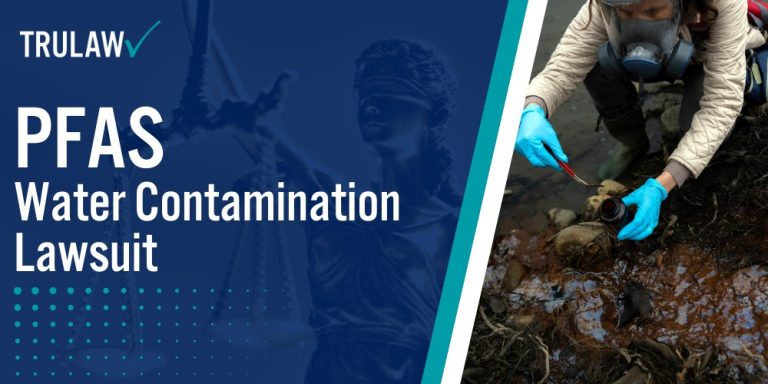PFAS Kidney Cancer Lawsuit
- Last Updated: March 17th, 2025

Attorney Jessica Paluch-Hoerman, founder of TruLaw, has over 28 years of experience as a personal injury and mass tort attorney, and previously worked as an international tax attorney at Deloitte. Jessie collaborates with attorneys nationwide — enabling her to share reliable, up-to-date legal information with our readers.
Legally Reviewed
This article has been written and reviewed for legal accuracy and clarity by the team of writers and legal experts at TruLaw and is as accurate as possible. This content should not be taken as legal advice from an attorney. If you would like to learn more about our owner and experienced injury lawyer, Jessie Paluch, you can do so here.
Fact-Checked
TruLaw does everything possible to make sure the information in this article is up to date and accurate. If you need specific legal advice about your case, contact us by using the chat on the bottom of this page. This article should not be taken as advice from an attorney.
Key takeaways:
- PFAS chemicals have been linked to an increased risk of kidney cancer through contaminated drinking water and other environmental exposures.
- Individuals diagnosed with kidney cancer who have been exposed to PFAS may be eligible to file a lawsuit seeking compensation for medical expenses, lost wages, and pain and suffering.
- Legal action against companies responsible for PFAS contamination is ongoing. Plaintiffs allege that manufacturers knew of the health risks associated with these chemicals but failed to warn the public adequately.
Overview of the PFAS Kidney Cancer Lawsuit
On this page, we’ll provide an overview of the PFAS kidney cancer lawsuit, the health effects of PFAS on military personnel, The PACT Act and veterans rights on PFAS, and much more.

Intro to the PFAS Kidney Cancer Lawsuit
The VA considers the following forms of kidney cancers as presumptive conditions:
- Clear Cell: A study in the PLCO cancer screening trial found a positive association between PFOA exposure and clear cell renal cell carcinoma specifically.
- Collecting Duct: Studies have found an increased risk of collecting duct carcinoma associated with higher blood levels of PFOA and an association between PFOS exposure and testicular cancer risk among Air Force servicemen.
- Wilms Tumor: Research is exploring possible connections between PFAS exposure and this type of kidney cancer, particularly in children.
- Chromophobe: Studies have linked PFAS exposure to an increased risk of kidney cancer, with higher blood levels of PFOA corresponding to a higher incidence of kidney cancer.
- Unclassified Types: Research is ongoing to determine the relationship between PFAS exposure and various unclassified kidney cancer types.
If you or a loved one has developed kidney cancer after being exposed to PFAS chemicals, you may be eligible for compensation.
Contact TruLaw using the chat on this page to receive an instant case evaluation and determine your eligibility to join others in filing a PFAS kidney cancer lawsuit today.
Table of Contents
PFAS Exposure and Increased Cancer Risk
PFAS exposure has been linked to a higher risk of cancer, particularly kidney cancer, among military personnel.
The per- and polyfluoroalkyl substances (PFAS) are prevalent at various military sites, posing significant health risks.
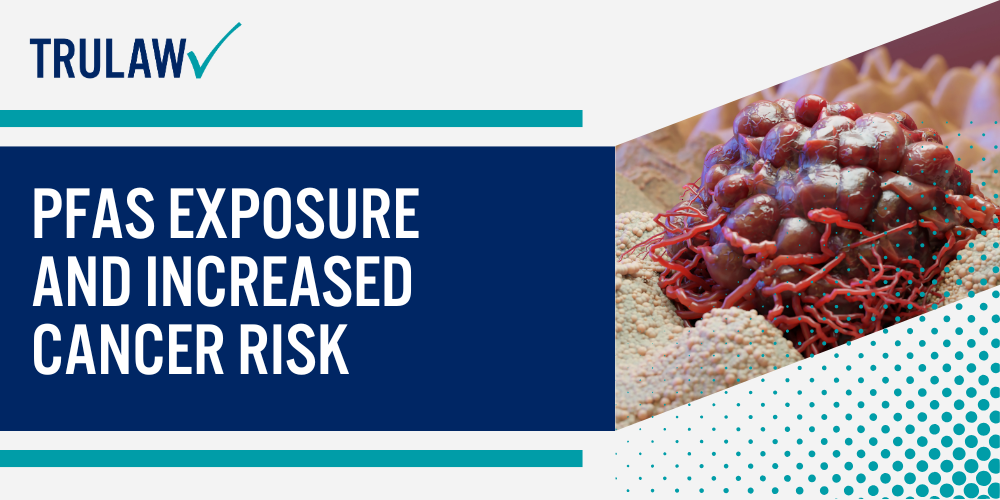
Extensive studies demonstrate the correlation between PFAS exposure and the onset of cancer in humans, emphasizing the need for awareness and preventative measures.
Military Sites Reported With PFAS Contamination
Numerous military installations worldwide have reported significant PFAS contamination.
These sites often have contaminated drinking water and environmental exposure due to aqueous film-forming foam (AFFF) used in training exercises.
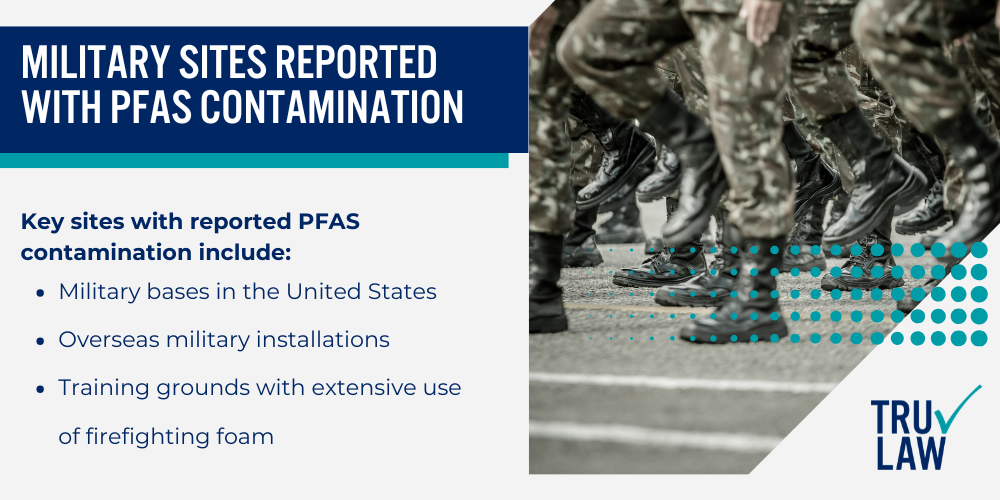
Key sites with reported PFAS contamination include:
- Military bases in the United States
- Overseas military installations
- Training grounds with extensive use of firefighting foam
Military personnel stationed at these locations are at an increased risk of developing health issues due to prolonged exposure.
Ensuring proper cleanup and regulation is crucial to mitigate these risks.
Studies on PFAS Exposure and Cancer Risks
Several studies have identified a strong link between PFAS exposure and an increased risk of developing kidney cancer.
These findings underscore the carcinogenic potential of PFAS.
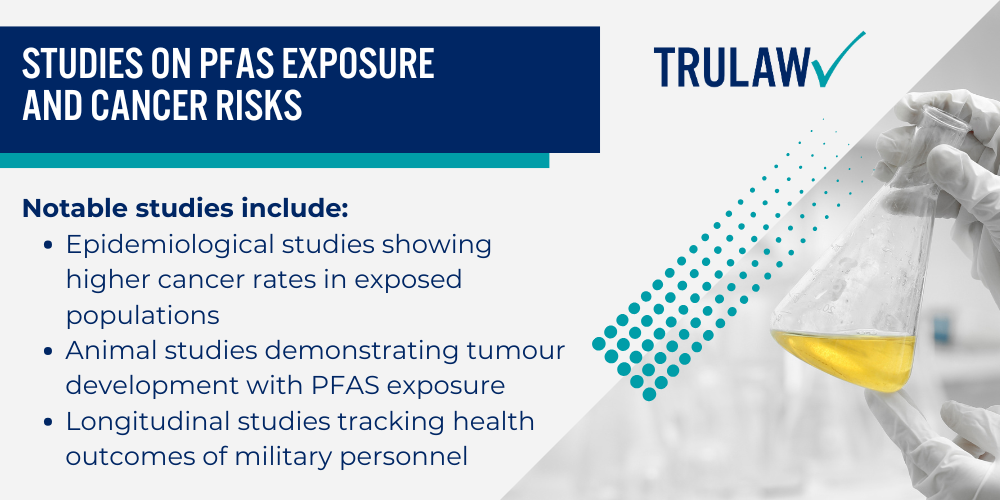
Notable studies include:
- Epidemiological studies showing higher cancer rates in exposed populations
- Animal studies demonstrating tumour development with PFAS exposure
- Longitudinal studies tracking health outcomes of military personnel
These studies highlight the urgent need for preventive measures and policies to protect those at risk.
Raising awareness among military members and veterans is essential for early diagnosis and treatment.
Health Effects of PFAS on Military Personnel
The health effects of PFAS exposure on military personnel are profound and multifaceted.
PFAS substances, often referred to as forever chemicals, accumulate in the human body over time, leading to various adverse health outcomes.

Military members are particularly vulnerable due to their prolonged and repeated exposure to these toxic substances at contaminated sites.
Common Health Issues Linked to PFAS Exposure
Exposure to PFAS chemicals can result in a range of health problems, some of which may be severe and long-lasting.
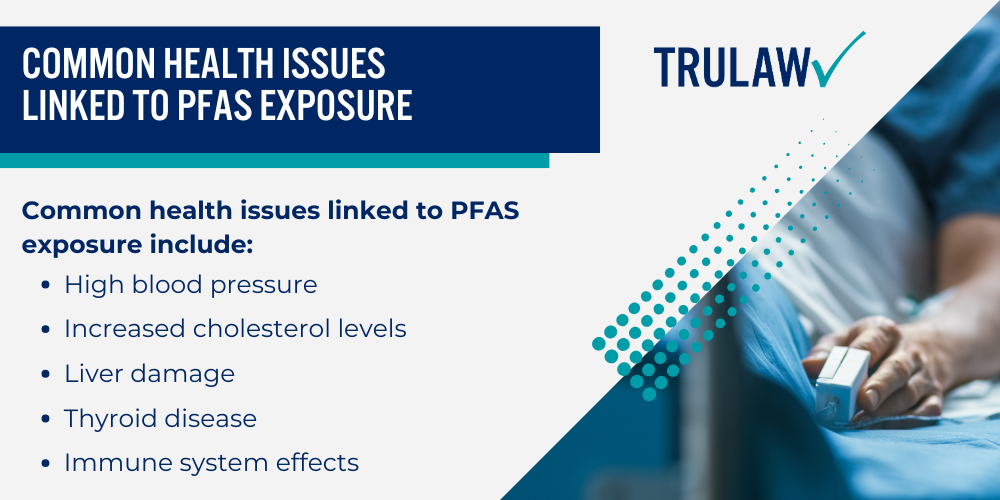
Common health issues linked to PFAS exposure include:
- High blood pressure
- Increased cholesterol levels
- Liver damage
- Thyroid disease
- Immune system effects
These conditions underscore the significant health risks posed by PFAS contamination.
Military personnel and veterans must be aware of these potential issues and seek medical advice if they experience related symptoms.
Specific Cancer Risks from PFAS Contamination
PFAS exposure is strongly associated with certain types of cancer, including kidney cancer.
Studies have shown that these chemicals can cause renal cell carcinoma and other malignancies in exposed individuals.
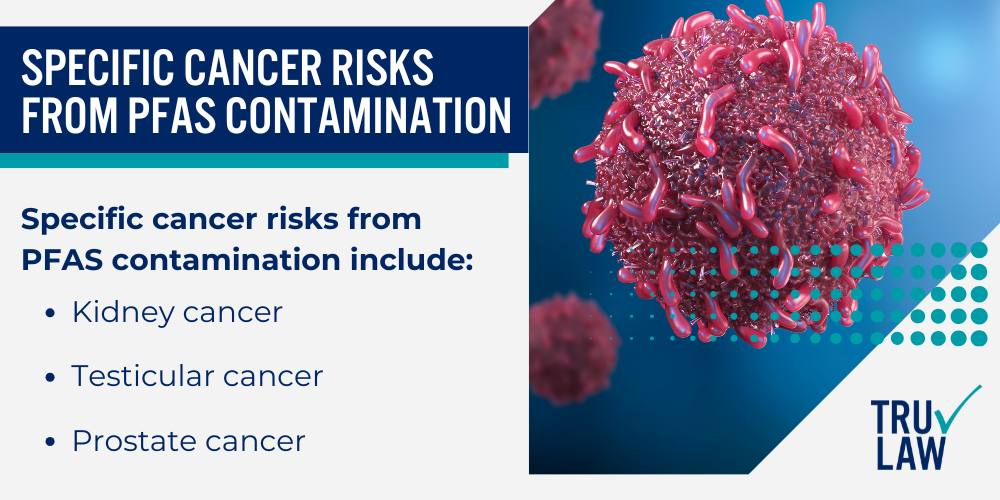
Specific cancer risks from PFAS contamination include:
- Kidney cancer
- Testicular cancer
- Prostate cancer
Understanding these risks is vital for early detection and treatment.
Military personnel should be particularly vigilant about any health changes and consult healthcare providers regularly.
Recognizing Kidney Cancer Symptoms from PFAS
Recognizing the symptoms of kidney cancer early can significantly improve treatment outcomes.
PFAS exposure has been linked to an increased risk of developing this type of cancer, making it crucial for military personnel and veterans to be aware of the signs.
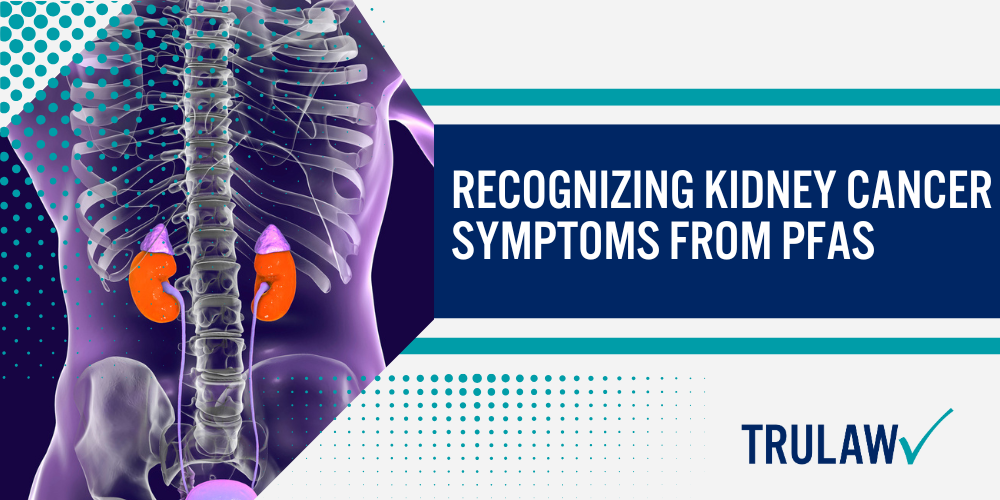
Early detection is often challenging, as initial symptoms may be subtle or mistaken for other conditions.
Early Signs and Symptoms of Kidney Cancer
Kidney cancer often begins without noticeable symptoms, which can delay diagnosis.
However, there are several early signs to watch for.
Common early signs and symptoms of kidney cancer include:
- Fatigue
- Persistent pain in the back or side
- Blood in the urine (hematuria)
It’s important to consult a healthcare professional for further evaluation if any of these symptoms are present.
Early intervention can lead to better management and outcomes.
Adverse health effects from PFAS can exacerbate these symptoms, making prompt medical attention even more critical.
Advanced Symptoms and Diagnostic Methods
As kidney cancer progresses, symptoms may become more pronounced and severe.
In advanced stages, patients may experience various symptoms requiring immediate medical attention.
Advanced symptoms of kidney cancer include:
- Unexplained weight loss
- Loss of appetite
- High blood pressure
Diagnostic methods such as imaging tests and biopsies are crucial in identifying the extent of the cancer and planning appropriate treatment strategies.
Military personnel with a history of PFAS exposure should undergo regular medical check-ups to catch any potential issues early.
Kidney cancer diagnosis often involves a combination of imaging techniques and laboratory tests.
Early detection and accurate diagnosis are key to effective treatment and disease control.
Developing kidney cancer due to toxic PFAS chemicals highlights the importance of continuous health monitoring.
The PACT Act and Veteran's Rights on PFAS
The PACT Act represents a significant step forward in providing support for veterans affected by toxic exposures, including those linked to PFAS.
This legislation helps ensure that veterans receive the healthcare and benefits they deserve, particularly those who have developed serious health conditions like kidney cancer due to PFAS exposure.

The Act simplifies veterans access to necessary medical care and compensation.
Key Provisions of the PACT Act for Veterans
The PACT Act includes several key provisions aimed at assisting veterans who have been exposed to toxic substances.
Key provisions of the PACT Act include:
- Expanded healthcare benefits for veterans with exposure-related conditions
- Simplified claims process for accessing benefits
- Increased funding for research on toxic exposures and their health impacts
These provisions are designed to ensure that veterans can obtain the support and resources they need more easily.
By reducing bureaucratic barriers, the Act aims to provide timely and effective assistance to those affected.
How the PACT Act Supports Veterans with Cancer
The PACT Act specifically addresses the needs of veterans diagnosed with cancer, including kidney cancer.
It recognizes several forms of cancer as presumptive conditions, making it easier for affected veterans to claim benefits.
Support measures under the PACT Act include:
- Recognition of kidney cancer and other cancers as presumptive conditions
- Streamlined benefits application process for veterans with cancer
- Enhanced access to specialized medical care for cancer treatment
By acknowledging the link between PFAS exposure and cancer, the Act provides crucial support to veterans seeking treatment and compensation.
This recognition helps veterans receive the necessary medical interventions and financial assistance promptly.
Filing Claims for PFAS-Related Kidney Cancer
Filing claims for PFAS-related kidney cancer can be a complex process, but the PACT Act has made it more accessible for veterans.
The Act acknowledges the health risks of PFAS exposure and provides a streamlined pathway for affected individuals to seek compensation and medical benefits.

Understanding the claim process and the necessary documentation is essential for a successful outcome.
Steps to Take for Filing a PFAS Cancer Claim
Veterans who believe their kidney cancer is related to PFAS exposure should follow specific steps to file a claim.
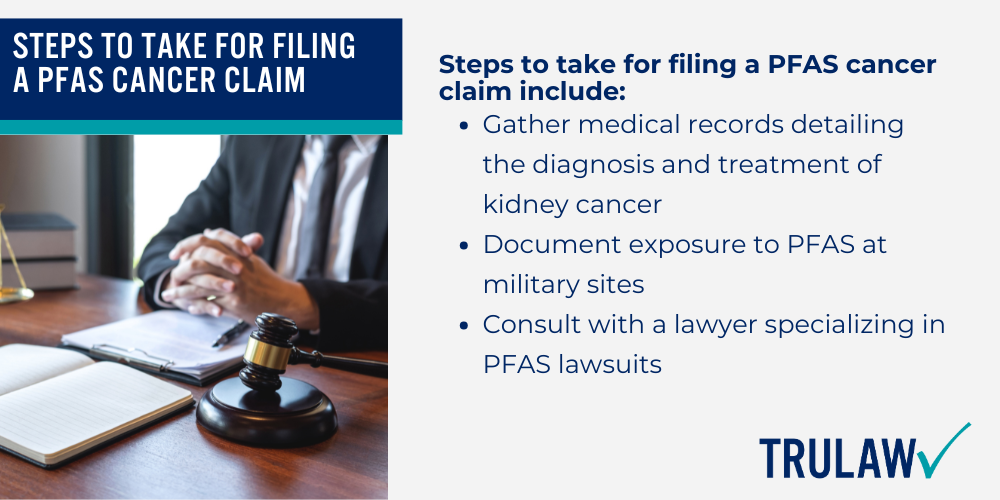
Steps to take for filing a PFAS cancer claim include:
- Gather medical records detailing the diagnosis and treatment of kidney cancer
- Document exposure to PFAS at military sites
- Consult with a lawyer specializing in PFAS lawsuits
These steps will help ensure that your claim is comprehensive and supported by the necessary evidence.
Working with a knowledgeable attorney can significantly enhance the chances of a successful claim.
Eligibility Criteria for PFAS-Related Cancer Claims
To be eligible for benefits under the PACT Act, veterans must meet certain criteria related to their PFAS exposure and cancer diagnosis.
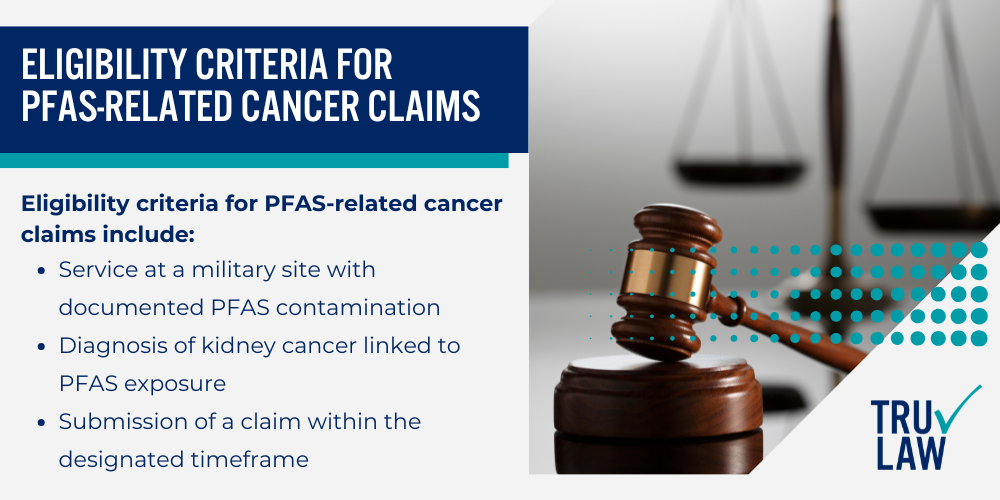
Eligibility criteria for PFAS-related cancer claims include:
- Service at a military site with documented PFAS contamination
- Diagnosis of kidney cancer linked to PFAS exposure
- Submission of a claim within the designated timeframe
Meeting these criteria is crucial for veterans seeking compensation for their kidney cancer cases.
Proper documentation and timely submission can significantly affect the outcome of the claim.
Recent Policy Changes on PFAS in the Military
Recent policy changes have been implemented to address the risks associated with PFAS exposure in the military.
These changes aim to reduce contamination and protect service members from the harmful effects of toxic substances.

Agencies like the Environmental Protection Agency are actively involved in regulating and mitigating PFAS risks.
New Policies to Mitigate PFAS Risks in the Military
The military has introduced several policies to reduce the impact of PFAS contamination on service members.
New policies to mitigate PFAS risks include:
- Restricting the use of AFFF firefighting foam
- Implementing regular monitoring of water sources for PFAS
- Providing alternative firefighting training materials
These policies are crucial in minimizing firefighting foam exposure and ensuring the safety of military personnel.
Continued efforts are necessary to address the long-term health risks associated with PFAS fully.
Ongoing Research and Cleanup Efforts by the DoD
The Department of Defense (DoD) is conducting ongoing research and cleanup efforts to tackle PFAS contamination at military sites.
These initiatives aim to identify contaminated areas and develop effective remediation strategies.
Ongoing research and cleanup efforts include:
- Site assessments to determine the extent of contamination
- Funding for PFAS-related health research
- Development of new cleanup technologies
These efforts are vital for protecting current and future service members from the adverse effects of PFAS exposure.
Collaboration with the Environmental Protection Agency and other organizations is essential for the success of these initiatives.
Insights on PFAS Contamination Linked to Kidney Cancer
The link between PFAS contamination and kidney cancers has become a significant concern, especially for military personnel exposed to these chemicals.
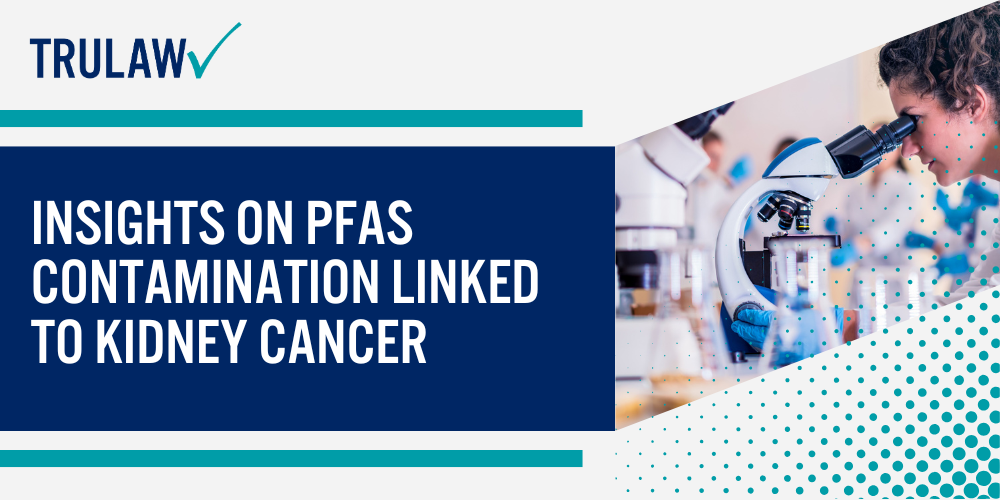
Understanding how PFAS exposure increases the risk of developing kidney cancer is crucial for effective prevention and treatment.
How Does PFAS Exposure Increase Kidney Cancer Risk?
PFAS exposure has been shown to disrupt normal cellular processes, leading to increased kidney cancer risk.
These chemicals persist in the environment and accumulate in the body over time, causing long-term health effects.
Factors contributing to increased kidney cancer risk include:
- Chronic exposure to contaminated water and soil
- Bioaccumulation of PFAS in the kidneys
- Disruption of cellular functions and DNA repair mechanisms
Awareness of these factors is essential for individuals who have been exposed to PFAS, especially those in the military.
What Are Common Symptoms of PFAS-Linked Kidney Cancer?
Recognizing the symptoms of kidney cancer early can significantly improve outcomes.
Although symptoms may vary, they often include common indicators that should not be ignored.
Common symptoms of PFAS-linked kidney cancer include:
- Persistent pain in the back or side
- Blood in the urine
- Unexplained weight loss
If these symptoms are present, seeking medical evaluation promptly is crucial.
Early detection and diagnosis can lead to better treatment options and outcomes.
How Does the PACT Act Benefit Affected Veterans?
The PACT Act provides substantial benefits to veterans affected by PFAS exposure, particularly those who have developed kidney cancers.

This legislation simplifies the process for obtaining healthcare and financial support, ensuring that veterans receive the assistance they need.
Steps to Take if Diagnosed with PFAS-Related Cancer
Veterans diagnosed with PFAS-related kidney cancer should take specific steps to secure the benefits provided by the PACT Act.
Steps to take if diagnosed with PFAS-related cancer include:
- Consult with a PFAS water contamination lawyer to understand your legal options
- File a claim with the Department of Veterans Affairs (VA) for healthcare benefits
- Gather medical records and evidence of PFAS exposure during service
Following these steps can help ensure that affected veterans receive the necessary support and compensation.
How to Prove PFAS Exposure Caused Your Cancer
Proving that PFAS exposure caused your kidney cancer can be challenging but is essential for obtaining benefits under the PACT Act.
Ways to prove PFAS exposure caused your cancer include:
- Documenting service at contaminated sites with known PFAS issues
- Providing medical evidence linking cancer to PFAS exposure
- Consulting with PFAS lawyers who specialize in these cases
Accurate documentation and professional legal assistance are crucial in building a strong case for compensation and benefits.
TruLaw: Legal Experts in PFAS Kidney Cancer Claims
TruLaw specializes in handling PFAS kidney cancer claims and AFFF firefighting foam lawsuits.
We provide expert legal support to veterans and military personnel affected by PFAS exposure.
Our team is dedicated to ensuring that clients receive the compensation and justice they deserve.
Legal Support for Veterans with PFAS-Related Cancer
At TruLaw, we offer comprehensive legal services to veterans diagnosed with PFAS-related kidney cancer.
Our expertise in PFAS lawsuits enables us to navigate the complexities of these cases effectively.
Our legal support includes:
- Personalized case evaluations to determine eligibility for claims
- Assistance with filing claims and gathering necessary documentation
- Representation in a PFAS cancer lawsuit or AFFF firefighting foam lawsuit
With our experienced team, veterans can confidently pursue their claims and secure the benefits they are entitled to.
How TruLaw Can Help with Your PFAS Kidney Cancer Lawsuit
TruLaw is committed to helping clients achieve successful outcomes in their PFAS kidney cancer lawsuits.
We understand the unique challenges veterans face and strive to provide the highest level of legal support.
How TruLaw can help with your PFAS kidney cancer lawsuit:
- Expert legal advice from a PFAS water contamination lawyer
- Comprehensive case management from start to finish
- Pursuing financial compensation for medical expenses and suffering
Our goal is to ensure that every client receives fair treatment and the maximum possible compensation for their injuries and losses while maximizing their PFAS lawsuit settlement to provide the best possible outcome in your case.
PFAS Contamination Lawsuit Frequently Asked Questions
-
Is there a PFAS class action lawsuit in 2024?
Yes, one notable case is the settlement reached by BASF for $315 million in a major PFAS class action lawsuit, where the defendant agreed to pay the settlement to public water suppliers.
Additionally, analysts predict a rise in PFAS litigation this year, with more lawsuits expected to be filed, resulting in higher settlement numbers.
-
What is a PFAS kidney cancer lawsuit?
A PFAS kidney cancer lawsuit is a legal action taken by individuals who have developed kidney cancer due to exposure to per- and poly-fluoroalkyl substances (PFAS).
These lawsuits seek to hold manufacturers and users of PFAS accountable for the harm caused by these toxic chemicals.
-
Who can file a PFAS kidney cancer lawsuit?
Individuals diagnosed with kidney cancer after being exposed to PFAS through contaminated water, products, or occupational settings may be eligible to file a PFAS lawsuit.
It is essential to consult with an experienced PFAS attorney to determine if you have a valid case.
-
What compensation can be sought in a PFAS kidney cancer lawsuit?
Plaintiffs in a PFAS kidney cancer lawsuit can seek compensation for medical expenses, lost wages, pain and suffering, and other damages related to their diagnosis.
The amount of compensation will depend on the specific circumstances of each case.
-
How do I prove that PFAS exposure caused my kidney cancer?
To prove that PFAS exposure caused your kidney cancer, your attorney will gather evidence such as medical records, expert testimony, and scientific studies linking PFAS to kidney cancer.
They will also investigate your history of exposure to PFAS-containing products or contaminated water.
-
What is the statute of limitations for filing a PFAS kidney cancer lawsuit?
The statute of limitations for filing a PFAS kidney cancer lawsuit varies by state.
It can range from one to six years after the diagnosis or discovery of the link between PFAS exposure and cancer.
It is crucial to consult with a PFAS attorney as soon as possible to ensure your claim is filed within the appropriate timeframe.

Managing Attorney & Owner
With over 25 years of legal experience, Jessica Paluch-Hoerman is an Illinois lawyer, a CPA, and a mother of three. She spent the first decade of her career working as an international tax attorney at Deloitte.
In 2009, Jessie co-founded her own law firm with her husband – which has scaled to over 30 employees since its conception.
In 2016, Jessie founded TruLaw, which allows her to collaborate with attorneys and legal experts across the United States on a daily basis. This hypervaluable network of experts is what enables her to share the most reliable, accurate, and up-to-date legal information with our readers!
You can learn more about the PFAS Contamination Lawsuit by visiting any of our pages listed below:
Here, at TruLaw, we’re committed to helping victims get the justice they deserve.
Alongside our partner law firms, we have successfully collected over $3 Billion in verdicts and settlements on behalf of injured individuals.
Would you like our help?
At TruLaw, we fiercely combat corporations that endanger individuals’ well-being. If you’ve suffered injuries and believe these well-funded entities should be held accountable, we’re here for you.
With TruLaw, you gain access to successful and seasoned lawyers who maximize your chances of success. Our lawyers invest in you—they do not receive a dime until your lawsuit reaches a successful resolution!
AFFF Lawsuit claims are being filed against manufacturers of aqueous film-forming foam (AFFF), commonly used in firefighting.
Claims allege that companies such as 3M, DuPont, and Tyco Fire Products failed to adequately warn users about the potential dangers of AFFF exposure — including increased risks of various cancers and diseases.
Depo Provera Lawsuit claims are being filed by individuals who allege they developed meningioma (a type of brain tumor) after receiving Depo-Provera birth control injections.
A 2024 study found that women using Depo-Provera for at least 1 year are five times more likely to develop meningioma brain tumors compared to those not using the drug.
Suboxone Tooth Decay Lawsuit claims are being filed against Indivior, the manufacturer of Suboxone, a medication used to treat opioid addiction.
Claims allege that Indivior failed to adequately warn users about the potential dangers of severe tooth decay and dental injuries associated with Suboxone’s sublingual film version.
Social Media Harm Lawsuits are being filed against social media companies for allegedly causing mental health issues in children and teens.
Claims allege that companies like Meta, Google, ByteDance, and Snap designed addictive platforms that led to anxiety, depression, and other mental health issues without adequately warning users or parents.
Transvaginal Mesh Lawsuits are being filed against manufacturers of transvaginal mesh products used to treat pelvic organ prolapse (POP) and stress urinary incontinence (SUI).
Claims allege that companies like Ethicon, C.R. Bard, and Boston Scientific failed to adequately warn about potential dangers — including erosion, pain, and infection.
Bair Hugger Warming Blanket Lawsuits involve claims against 3M — alleging their surgical warming blankets caused severe infections and complications (particularly in hip and knee replacement surgeries).
Plaintiffs claim 3M failed to warn about potential risks — despite knowing about increased risk of deep joint infections since 2011.
Baby Formula NEC Lawsuit claims are being filed against manufacturers of cow’s milk-based baby formula products.
Claims allege that companies like Abbott Laboratories (Similac) and Mead Johnson & Company (Enfamil) failed to warn about the increased risk of necrotizing enterocolitis (NEC) in premature infants.
Here, at TruLaw, we’re committed to helping victims get the justice they deserve.
Alongside our partner law firms, we have successfully collected over $3 Billion in verdicts and settlements on behalf of injured individuals.
Would you like our help?
